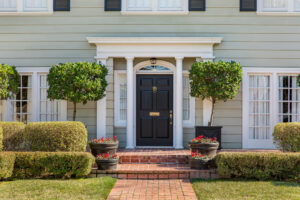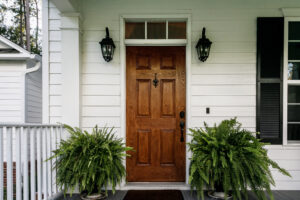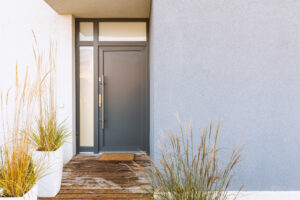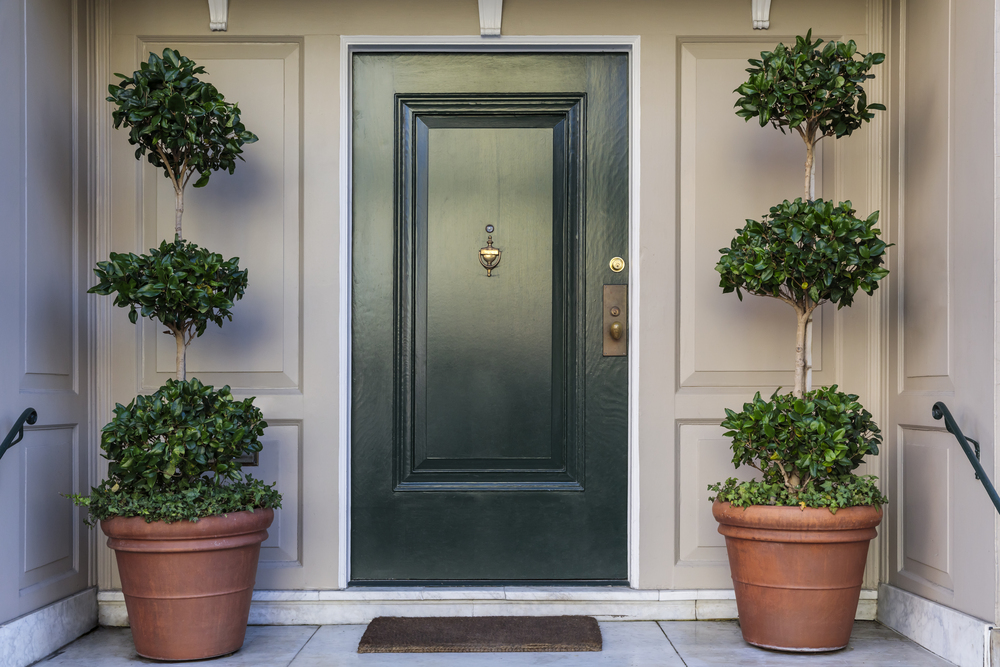Your front door is an important component of your home. Not only is it the first thing that welcomes visitors and guests, but it’s also your first line of defense against the elements. Choosing the right front door has an impact not only on the style and aesthetic of your home, but also on how well it keeps wind, rain, and snow out and heated or air-conditioned air in.
What Types of Exterior Doors Are There?
When it comes to choosing the right exterior door for your home, it’s important to first understand your main options: fiberglass, wood, and steel. All three options have their advantages, but they each have a few drawbacks — all of which we’ll discuss in more detail below.
Which Type of Exterior Door Material Is Best?
There is no overarching “best” exterior door material. Rather, the best material for your home depends on a variety of factors.
TL;DR? Here are our short-and-sweet exterior door recommendations:
- Choose a fiberglass exterior door for longevity
- Choose a wood exterior door for character and style
- Choose a steel or metal exterior door for a budget-friendly option
To truly answer this question though, keep reading for the complete breakdown of the pros and cons of wood, steel, and fiberglass exterior doors.
Fiberglass Exterior Doors

Fiberglass offers most homeowners a range of possibilities when it comes to exterior doors. Fiberglass exterior doors are made from two large molded sides that are filled in the center with a polyurethane foam core that insulates the door against extreme temperatures. This manufacturing process makes fiberglass one of the most durable and energy-efficient options on the market.
Interested in a fiberglass exterior door? Shop our selection of Therma-Tru® products.
Advantages of Fiberglass Doors
- Low maintenance — Fiberglass is a composite material that is resistant to fading, cracking, and chipping. Compared to both steel and wood, a fiberglass exterior door will require the least amount of maintenance, because it doesn’t have to be re-stained or repainted regularly.
- Durable — In addition to minimal maintenance requirements, fiberglass doors are exceptionally durable. They don’t chip or dent like a wood or steel door might, which makes them a great option for your front door — the barrier between your home and the outside world. In general, a fiberglass door will outlast both a wood and a steel door because of its composite construction.
- Energy-efficient — Fiberglass doors were designed with energy efficiency in mind. While you can customize nearly any fiberglass exterior door to have more or less insulation, all fiberglass doors are manufactured with a thick layer of insulating foam in the center. This makes fiberglass exterior doors perfect for homes that experience extreme weather conditions.
- Customizable — Because fiberglass doors are manufactured from a composite material, they offer a vast range of options when it comes to shape and finish. You can order custom fiberglass doors to easily fit any entryway, and you can choose from traditional flat finishes or opt for a finish that mimics the look of wood with a fine grain and a stained finish.
- Reasonable Cost — In general, fiberglass doors tend to cost a bit less than wood doors, and a bit more than steel doors, putting them right in the middle of the three options. Fiberglass doors also don’t require regular maintenance, so many homeowners find they recoup the upfront cost of a fiberglass door throughout its lifespan, both in saved energy and maintenance costs.
Disadvantages of Fiberglass Doors
- Appearance — If you love the appearance of true natural wood, a fiberglass door may not quite meet your standards. While fiberglass doors are designed to mimic the appearance of wood, they are still fiberglass. Some homeowners find that fiberglass doors just don’t have the same look and feel as genuine wood.
- Difficult to DIY — Because fiberglass doors generally come as an entire door-frame-hardware unit and often come with a warranty that is contingent on this kit being correctly installed, it’s best to have fiberglass doors installed professionally.
Wood Exterior Doors

A wood exterior door is a classic choice for any home. If you prefer a more traditional look or are hoping to add a bit of character to your entryway, a wood door is a great choice, especially considering its naturally insulating properties.
Interested in purchasing a wood exterior door? We carry a great selection of beautiful Glenview Doors. Stop by one of our locations or get in touch online to explore options.
Advantages of Wood Doors
- Character & style — Wood is undoubtedly the go-to material if you’re trying to achieve a high-end, architecturally unique entryway. Though some fiberglass doors can be made to look like wood, you won’t get true character from anything but a real wood door.
- Easy to repair — Wood is easily sanded and re-stained if you run into any superficial weathering or scratches. This makes maintenance for any damage pretty easy. Plus, wood will hide scratches or dents well, unlike fiberglass or steel, which don’t have the texture to hide minor damage.
- Energy-efficient — Solid wood front doors have a naturally high R-value that can help protect your home from the elements. While a wood door won’t be as energy efficient as a high-end fiberglass door, you’ll still get a decent amount of protection as long as you choose a solid hardwood option or a door with an insulating wood core.
Disadvantages of Wood Doors
- Cost — In general, you’re going to pay quite a bit more for a wood exterior door, especially if you’re looking at custom options or wood exterior doors with glass inserts.
- Maintenance — Unlike a steel or fiberglass door, a natural wood door will require regular maintenance to withstand the elements. You’ll have to stain and refinish your wood exterior door annually to help maintain its beauty and protect it from moisture rot or premature weathering.
- Warping — Even if your wood exterior door is well-maintained, wood has a natural tendency to expand and contract in extreme temperatures. Over time, this can contribute to warping and cracking, which can affect how your door fits in the entryway. A newer type of wood door that uses wood veneer over an engineered wood core is designed to resist bowing and warping.
Steel Exterior Doors

Steel exterior doors are an excellent option for any home that just needs a simple, durable exterior door. A popular favorite for garage and side doors, steel doors do offer a variety of advantages for any homeowner.
Interested in a steel exterior door? Shop our selection of Therma-Tru® products.
Advantages of Steel Doors
- Low cost — Of all of the exterior door options, a steel door requires the lowest upfront investment. You can find a variety of steel door options all at a considerably lower cost than a wood or fiberglass door, simply because steel doors are much less expensive to manufacture.
- Low maintenance — Steel exterior doors are also very low-maintenance. Unlike wood, they won’t rot or warp over time, so you don’t have to worry about regularly staining or refinishing your exterior steel door.
- Security — Steel doors are going to offer the greatest protection against unwanted entry, as they are stronger than wood or fiberglass and generally have strong, reinforced hinges.
Disadvantages of Steel Doors
- Aesthetics — Steel exterior doors don’t offer the same range of finish options as fiberglass doors. Steel is almost exclusively available in flat, painted colors and cannot mimic the appearance of wood. This is what makes steel doors popular for garages and side entries. While they aren’t necessarily high-end, they can get the job done, keeping harsh elements out of your home.
- Durability — While steel itself is a durable material, steel doors can dent fairly easily, and they also have a tendency to rust over time. Since dents in steel doors aren’t simple to fix, this shortens their lifespan, especially when compared to a fiberglass door.
- Energy efficiency — Metal is a conductor, making steel doors not highly energy efficient. If you choose a steel door that does not have a foam core, you’ll notice that it can be relatively drafty. While you can purchase steel doors that feature an insulated core, they still don’t offer the same level of energy efficiency as a fiberglass door, since steel will absorb heat or cold.
Shop Exterior Doors at Zeeland Lumber & Supply
Whether you’ve decided on a particular door material or could use a little more help choosing the best option for your home, get in touch with the team at Zeeland Lumber & Supply. We offer exterior doors in fiberglass, wood, and steel from some of the best brands on the market. Stop into one of our local showrooms to see what might make the best fit for your home.


